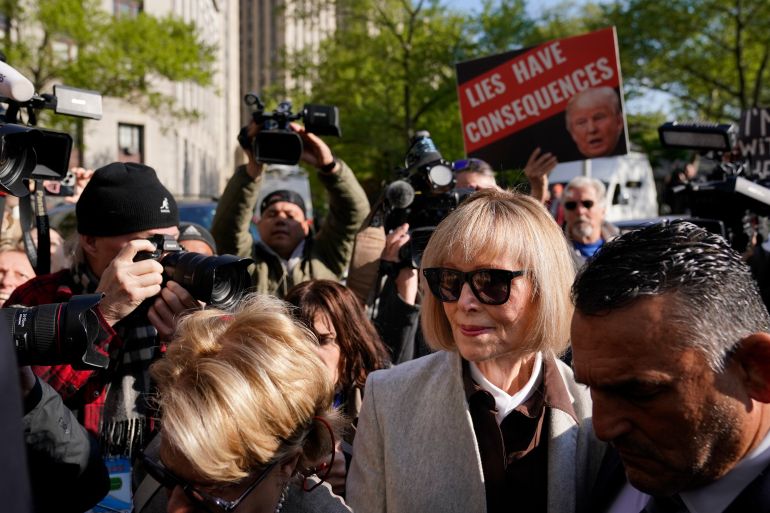What to know about E Jean Carroll civil rape trial against Trump
Carroll is suing Trump for alleged rape under new New York law and defamation; she says attack took place in mid-1990s.

The latest legal proceedings against former United States President Donald Trump have begun – this time a civil case connected to rape allegations made by former magazine advice columnist E Jean Carroll.
The trial comes just weeks after Trump made his first appearance in Manhattan’s criminal court, where he was charged with 34 felony counts of falsifying business records. He pleaded not guilty.
Keep reading
list of 3 itemsTrump vows to ‘never’ drop out of the 2024 presidential race
Pence booed at NRA meeting in US as he tries to outflank Trump
The most recent trial also takes place in Manhattan, this time in federal civil court, although Trump’s lawyers have indicated he is unlikely to testify. Because the case is civil, not criminal, Trump is not in danger of being sentenced to prison if found guilty.
Here’s what you need to know:
Rape allegation
Carroll has alleged that Trump raped her in the fitting room of the luxury department store Bergdorf Goodman in Manhattan in either late 1995 or early 1996.
The attack occurred after Carroll, then a well-known Elle magazine columnist, unexpectedly bumped into Trump. The real estate scion invited her to shop with him for a woman’s lingerie gift before they teased one another to try on a garment.
Carroll has said they ended up alone together in a store dressing room, where Trump pushed her against a wall and raped her before she fought him off and fled. Carroll first made her accusations in a 2019 memoir.
Trump has vehemently denied that a rape ever occurred or that he even knew Carroll, a longtime columnist for Elle magazine. He has labelled Carroll a “nut job” and “mentally sick”. He claimed she fabricated the rape claim to boost sales of her book.
What does the lawsuit say?
Carroll’s lawsuit has two main components.
The first is the rape allegation. While such a charge would normally be tried in criminal court, the alleged incident had passed New York’s statute of limitations – the amount of time after a crime is committed that the alleged perpetrator can be criminally tried.
However, New York state enacted a law in November of last year that allows individuals to file lawsuits against alleged sexual abusers, even if the abuse occurred decades ago. If Trump is found liable for the battery claim, he could be ordered to pay cash, with the amount yet to be determined.
In court documents, Carroll has said that she told friends about the attack in the immediate aftermath, but was inspired to come forward publicly in the wake of the MeToo movement, which gained steam in 2017 after an array of sexual abuse allegations against film producer Harvey Weinstein emerged.
The second component is a defamation claim made against Trump for the disparaging remarks he made about her in denying the rape allegations. Carroll had initially filed a separate lawsuit only alleging defamation before the New York law allowing lawsuits against alleged sexual abusers was enacted. That suit is still pending.
What will happen at the trial?
Jury selection began on Tuesday, with Judge Lewis A Kaplan saying jurors’ names will be withheld from both the public and the lawyers, to protect them against possible harassment.
Carroll was expected to testify during the trial, along with several other women who have accused Trump of abuse.
The accusers include Jessica Leeds, who is set to say that Trump tried to put his hand up her skirt on a 1979 flight on which the two were assigned neighbouring seats.
Natasha Stoynoff, a former People magazine staff writer, was also set to testify that Trump pinned her against a wall and forcibly kissed her at his Florida mansion when she went there in 2005 to interview Trump and his then-pregnant wife Melania Trump.
Jurors were also expected to be shown see the 2005 Access Hollywood video in which Trump is heard making misogynistic remarks about women, including an assertion that celebrities can sexually grab women without asking.
Kaplan has also instructed lawyers on both sides not to say anything in front of prospective jurors about who was paying legal fees, after reports emerged that Carroll’s legal team had received funding from American Future Republic, a left-centre organisation funded by LinkedIn co-founder Reid Hoffman.
In earlier questioning, Carroll has said her lawyers were relying solely on contingency fees, meaning they only collected money if the case is won.
Could Trump make an appearance?
While Trump’s lawyers have said he will not attend the trial or testify, that is subject to change.
If he does not make an appearance, the jury may be shown excerpts from his video-recorded deposition.
Trump’s lawyers had requested that jurors be told that the ex-president wanted to spare the city the disruption his presence might have caused. Kaplan has denied that request, noting that Trump has a New Hampshire campaign event scheduled for Thursday, the third day of the trial.
“If the Secret Service can protect him at that event, certainly the Secret Service, the Marshals Service, and the City of New York can see to his security in this very secure federal courthouse,” Kaplan wrote in an order.